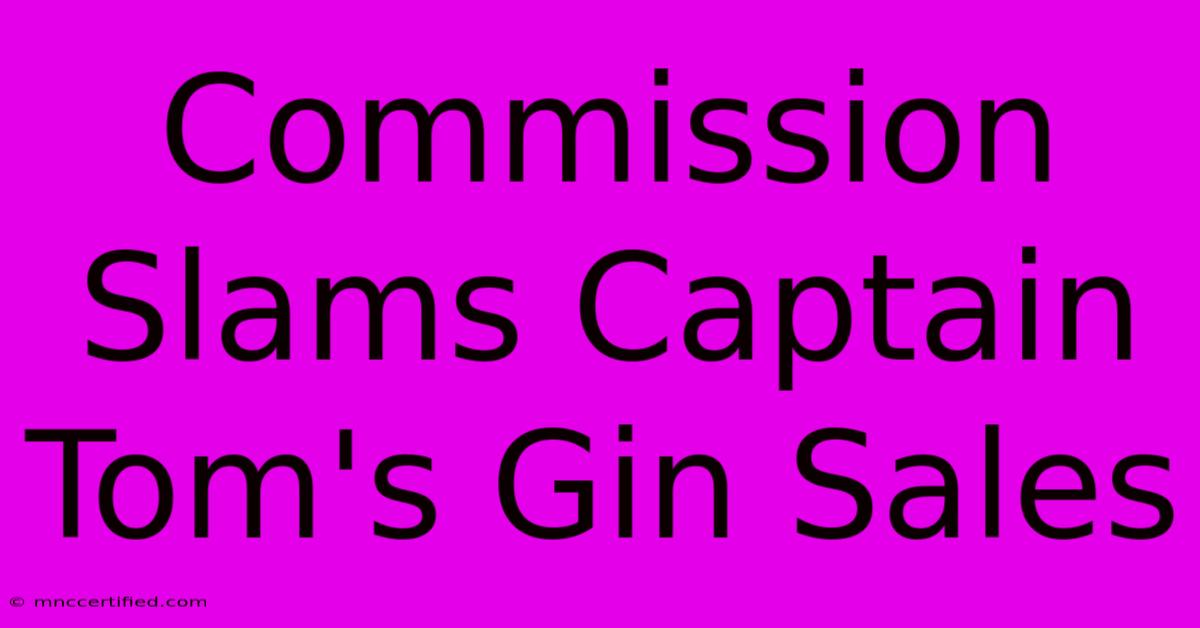Commission Slams Captain Tom's Gin Sales

Table of Contents
Commission Slams Captain Tom's Gin Sales: A Marketing Mishap?
The heartwarming story of Captain Sir Tom Moore, who raised millions for the NHS by walking laps of his garden, was tragically overshadowed by recent controversies surrounding his namesake gin brand. Reports of low commission rates paid to sales representatives have sparked outrage, raising questions about the brand's marketing strategy and its impact on sales. This article delves into the specifics of the commission structure, its potential effects on sales performance, and the broader implications for the Captain Tom Moore brand.
The Controversy Explained: Low Commission Rates and Sales Representatives' Concerns
The core issue revolves around the commission structure offered to those selling Captain Tom's Gin. Reports suggest that sales representatives receive a comparatively low commission rate, significantly less than what is considered standard within the spirits industry. This has led to widespread discontent amongst the sales team, with many voicing their frustrations publicly. The low payouts are perceived as unfair, especially given the charitable nature of the brand and the positive public image associated with Captain Tom Moore's legacy.
This dissatisfaction isn't just a matter of disgruntled employees; it has significant implications for the sales of Captain Tom's Gin. A demotivated sales force is far less likely to actively promote the product, potentially leading to reduced sales figures and a missed opportunity to capitalize on the brand's strong initial recognition. Essentially, a flawed commission structure is directly impacting the bottom line.
The Impact on Sales: A Negative Feedback Loop
The low commission rates create a negative feedback loop. Unhappy sales representatives may:
- Reduce their sales efforts: Why invest significant time and energy selling a product with meager rewards?
- Prioritize other products: Sales reps might focus their efforts on brands offering better commission structures.
- Negatively impact brand reputation: Dissatisfied employees might share their negative experiences, potentially harming the brand's image.
This combination of factors can severely hinder sales growth, creating a significant challenge for the company. The initial goodwill associated with Captain Tom's name may not be enough to overcome the damaging effects of a poorly structured incentive program.
Marketing Lessons from the Captain Tom's Gin Commission Fiasco
This situation serves as a crucial case study in the importance of fair compensation and a well-defined marketing strategy. Effective sales teams are motivated by more than just the product itself; they need a fair share of the profits to feel valued and incentivized. The Captain Tom's Gin situation highlights the potential pitfalls of:
- Ignoring sales team feedback: A company must actively listen to its sales force and address their concerns.
- Underestimating the importance of compensation: A competitive commission structure is vital for attracting and retaining top talent.
- Disconnecting from brand values: The conflict between the charitable nature of the brand and the low commission rates creates a disconnect that damages brand credibility.
The company needs to carefully reassess its sales strategy and implement changes to address these issues. Simply relying on the initial brand awareness generated by Captain Tom Moore's story is not a sustainable long-term marketing strategy.
Future Implications and Potential Solutions
The Captain Tom's Gin brand faces a crucial crossroads. To recover, it must:
- Review and revise its commission structure: Offering a competitive commission rate is crucial to regain sales team morale and boost sales performance.
- Improve communication and transparency: Open communication with sales representatives can build trust and address concerns.
- Reinforce the brand's charitable mission: Highlighting the charitable contributions generated by the gin sales can reinforce positive brand associations.
The controversy surrounding Captain Tom's Gin's commission structure offers a stark reminder that even the most compelling brand stories require robust and ethical business practices to succeed in the long term. The lack of attention to the sales team's compensation directly impacted the bottom line, highlighting the critical role of fair compensation and effective marketing strategies in achieving sales success.

Thank you for visiting our website wich cover about Commission Slams Captain Tom's Gin Sales. We hope the information provided has been useful to you. Feel free to contact us if you have any questions or need further assistance. See you next time and dont miss to bookmark.
Featured Posts
-
Gautam Adani Us Fraud Cnbcs Update
Nov 22, 2024
-
Who Pays Builders Risk Insurance
Nov 22, 2024
-
Sorority Life Penn State Student Journey
Nov 22, 2024
-
Explore Penn States Impact Map
Nov 22, 2024
-
What Does Alae Mean In Insurance
Nov 22, 2024